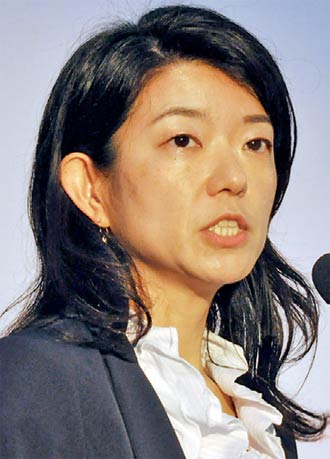Friday Feb 20, 2026
Friday Feb 20, 2026
Wednesday, 13 December 2023 00:20 - - {{hitsCtrl.values.hits}}

Panel Discussion on ‘Mainstreaming human development, Re-calibrating growth and Making change happen’


UNDP Resident Country Representative Azusa Kubota

Prime Minister Secretary Anura Dissanayake

UNDP Economist Dr. Vagisha Gunasekara
By Divya Thotawatte
UNDP 2024 Asia-Pacific Human Development Report was launched yesterday, highlighting that despite being the region’s top performer, Sri Lanka’s Human Development Index (HDI) could decline and result in a potentially more turbulent future without immediate actions for change.
UNDP launched the report titled, ‘Making our Future: New directions for Human Development in Asia and the Pacific’ under the umbrella of the flagship Colombo Development Dialogues. Utilising the most current data, evidence, and analytical perspectives, the Regional Human Development Report (Regional HDR) offers an extensive and finely detailed evaluation of Human Development in Asia and the Pacific.
Speaking at the event, Secretary to the Prime Minister Anura Dissanayake said that the failure to adopt innovative approaches would place Sri Lanka at the precipice of recurrent economic crises and that the report served as a reminder that true progress was not measured solely by economic growth. The evidence provided by reports such as the Regional HDR depicted the necessity to create space for even the most marginalised, and leaves no one behind in the process of development, he reflected.
“As we prioritise rebuilding as a country, we also need to lay out the safety nets in the form of social protection for the most vulnerable and the people who have been severely impacted by the crisis. UNDP has provided us through the Multi-dimensional Vulnerability Index and now the Regional Human Development Report evidence that can contribute to an equation that will assist us in getting the formula right to plan accordingly to ensure no one is left behind as we rebuild from the ruins of the economic crisis,” Dissanayake explained.
Experts at the event discussed the content of the report, emphasising that despite the progress of the region of Asia Pacific, it was behind on achieving its sustainable development goals (SDGs) by 2030. They brought out factors affecting the region’s as well as the country’s HDI such as unmet aspirations, heightened human insecurity and a potentially more turbulent future. In order to battle these challenges, the region’s development strategy needed to focus more on improving the lives of both current and future generations, they stressed.
UNDP Policy and Engagement Team Economist Dr. Vagisha Gunasekera said that despite Sri Lanka being the region’s top HDI performer, the country’s unmet aspirations could be seen since prior to Covid-19, where the country had been regressing on SDGs (sustainable development goals) such as SDG 8 which includes economic and social affairs and SDG 17 which included partnerships.
Furthermore, prior to the economic crisis, there was widespread structural inequalities, gender biases, and large informal sector in Sri Lanka which was worsened by the pandemic, the economic crisis and the rise of the cost of living amid global geopolitical conflicts.
“Sri Lanka is a country with a fairly high-income inequality and we are on the top 1/3 of the most unequal countries in the world. The wealth inequality is also very high. For instance, the top 1% of Sri Lankans own 31% of the total personal wealth on the country, whereas the bottom 50% own less than 4% of the total wealth.” Gunasekera explained that when Sri Lanka’s HDI figure is adjusted in relation to this income/ wealth inequality, it would drop by 10.6%.
There were also increasing gender inequalities causing heightened human insecurity like declining numbers of women in the labour force and the parliament, and inequalities in women’s digital and technological literacy, particularly in the STEM field that affected women’s access to employment. There were also alarming rates of gender-based violence.
“On top of this, the region and Sri Lanka face looming triple planetary crisis: climate change, pollution and biodiversity loss all of which are hitting the most vulnerable population the hardest.” While Sri Lanka is among the top 10 climate vulnerable countries, other challenges such as fragile economic recovery after the pandemic and economic crisis, Sri Lanka’s household debt which has reached 7.3% of nominal GDP and global geopolitical uncertainties that have resulted in rising living costs and exacerbated insecurity would result in a potentially more turbulent future.
Gunasekera advised that in recovering from the aforementioned challenges and issues, Sri Lanka needed to mainstream human development, recalibrating growth strategy and making change happen. For this change, expanding people’s choices through engagement of state and non-state actors in social dialogues and practices, empowerment of vulnerable groups, and eliminating discrimination by addressing social norms was essential. Moreover, enhanced human security and accelerating the transition towards carbon-neutral and climate-resilient development was crucial.
Emphasising the slow meltdown of the development of the region, UNDP Sri Lanka Resident Representative Azusa Kubota also said that in order to overcome the highlighted challenges, it was necessary to follow people-centric perspectives in creating change, safeguard the interests of future generations, tackle inequalities in all its forms and empower collaborative change where communities and institutions should work together. Furthermore, mainstreaming human development, recalibrating growth strategies and making change happen were the pillars of change, she added.
A panel discussion was also held on the topic, ‘Mainstreaming human development, Re-calibrating growth and Making change happen’ featuring University of Colombo Department of Economics Professor Sirimal Abeyratne, Centre for Poverty Analysis Researcher Dr. Gayathri Lokuge, Department of National Planning Director General RHWA Kumarasiri, Good Market Lanka Co-Founder Achala Samaradiwakara, and LIRNEasia Research Manager Merl Chandana.
- Pix by Lasantha Kumara